|
FAQs about Marine Snail
Identification 14
Related Articles: Gastropods, Sea Slugs, Mollusks, Abalone,
Related FAQs: Snail ID
1, Snail ID 2, Snail ID 3, Snail
ID 4, Snail ID 5, Snail ID 6, Snail
ID 7, Snail ID 8, Snail ID 9, Snail ID
10, Snail ID 11, Snail ID 12, Snail
ID 13, Snail ID 15, Snail ID 16, Snail ID
17, Snail ID 18, Snail ID 19, Snail ID
20, Snail ID 21, Snail ID 22, Snail
ID 24, Snail ID 25, Snail ID 26, & Marine Snails 1, Marine Snails 2, Marine Snails 3, Invertebrate ID, Snail Behavior, Snail Selection, Snail Compatibility, Snail Systems, Snail Feeding, Snail Disease, Snail Reproduction, Mollusks, Sea
Slugs, Abalone,
|
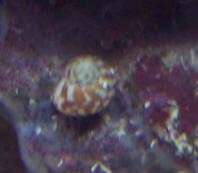
|
|
Mystery Marine Eggs, Likely Snails --
1/29/08 Hi everyone, <Hi Rochelle.> Have some mystery
eggs here I hope you can tell me what they are. No one is
guarding them or tending to them (so far, it's been 3 hours)
so I am unable to figure it out. Here are the
possibilities'¦ I have '¦ 3 Percula clownfish,
(but when I looked up their eggs, it showed them yellow then
turning to orange/red as they develop) I was rather hoping they
were clownfish. I have 2 mated 3 strip damsels, BUT.. the male is
currently tending to his own eggs on the opposite side of the
tank, so that can't be it. <Correct. Neither of these
species lay/deposit eggs in strands.> 1 magenta dotty back,
she has her own private cave. If they were hers you'd think
she would've laid them in there, not on a rock outside. 1
Hawkfish, I think he's a male and wouldn't have laid eggs
out in the open if he was female. 1 Chromis damsel, 1 mandarin
goby, 1 clown goby and some pink foot snails. I don't think
it was the snails, they weren't in the area at the time the
eggs 'appeared'. <Heeee! They're sneaky that way.
I don't know what species the 'pink foot snail' is,
but that egg strand looks like it came from either a snail or
Nudibranch of some sort.> I do have some crabs, blue legs, a
sally and a hermit, but that can't be right, crabs don't
lay eggs like that do they? <No, they don't.> When I
looked up the different fish I have, and what their eggs look
like, my eggs don't look like any of them. So do you think
they are clownfish? <Alas, no. It's more than likely a
"snail trail".> If so I'd like to move them to
my nursery tank (already to go with micro food stuffs). If you
think they belong to any other fish I'll leave them be. Due
to them not having a mate to fertilize them.
<That's how I'd handle these - leave
them and let 'nature' take its course.> Thanks in
advance, Rochelle
<You're very welcome. Take care. -Lynn>
|
|
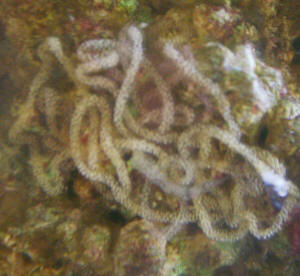
|
New Tank Issues, Snail ID - Collonista sp? 1/15/08
Hello, <Hello there, EA! LZ here today.> My husband and I
recently purchased and set up a reef tank (29 gallon BioCube) about a
week ago. <Congratulations!> We purchased a large amount of live
rock the day we purchased the entire set up, but nothing seems to be
living on that bunch of rock. <Yet!> However, two days ago we
purchased a large (7lb) solid piece of Fiji live rock. After two days,
we have 2 fans, 2 groups of white star polyps, a Stomatella, a small
bristle worm, and 4-5 extremely tiny snails, which we cannot seem to
identify. The snails are about 2-3mm in size, iridescent white with
tiny orange spots, with circular shells like regular garden snail
shells. We've searched the internet and your site for hours and
cannot find any pictures/articles that identify our tiny snails. I
would send a picture, but the snails are so small that they only show
up as microscopic white specks. Do you have any idea as to what kind of
juvenile snails these might be? <If they're mobile, they sound a
lot like Collonista sp. snails, aka 'Mini Turbos'. They're
extremely common, harmless/beneficial grazers, mostly nocturnal, small
(max out at ~1/4', but most are around 3mm), that make a terrific
addition to a reef tank. Color/pattern varies, with some being all
white, while others are combinations of white with varying amounts of
mottled tan/brown/even pink markings. Please see these links for more
information and confirmation (about 2/3 way down the page at the first
link): http://www.reefkeeping.com/issues/2004-05/rs/index.php
http://www.wetwebmedia.com/snailidf14.htm . If what you're seeing
are small stationary white coils (possibly the orange specks are
incidental), then those are likely Spirorbids (tiny/harmless feather
dusters). http://www.wetwebmedia.com/featheridfaqs.htm.> Also, we
have a large amount of algae (brown diatomaceous) building up on the
1st bunch of live rock and are looking to purchase a "clean-up
crew." Tank stats are as follows: pH: 8.2-8.4, nitrite, nitrate,
ammonia: 0 by our test scale. <I'd wait. The appearance of
diatoms is all very normal in a new tank. It's just too early in
the cycling process to add anything. Also, when your tank is completely
cycled, be sure to add livestock in slow/small increments. Please see
these links for more information:
http://www.wetwebmedia.com/brownalgcontfaqs.htm
http://www.wetwebmedia.com/marsetupii.htm .> We were contemplating
an Arrow crab, Emerald crab, hermit crabs and/or shrimp. Considering
the critters already housing themselves in our tank, what would you
recommend? <Once your tank cycles completely, you could add a
Cleaner Shrimp -- something like a Lysmata amboinensis, or Lysmata
grabhami. I love these little guys. They're well behaved, hardy,
beautiful, and make great additions. I'd stay away from any crabs.
They tend to be pickers, and not too picky about what they pick at, or
eat! Hermits can be interesting as well, but you have to make sure you
get the best species for your tank. Some get pretty large, and even the
small ones can pose a risk to snails, some corals. It just depends on
what you'd like to ultimately have/keep in your tank. The most
important thing to do is ask questions and read, read, read! To that
end, guess what? I've got more links for you! Here are some
regarding Lysmata Shrimp, crabs, and hermits:
http://www.wetwebmedia.com/hippolytidae.htm
http://www.wetwebmedia.com/marine/inverts/arthropoda/crabs/swcrabs.htm
http://www.wetwebmedia.com/marine/inverts/arthropoda/crabs/hermitcrabs.htm
.> Thanks in advance, EA <You're very welcome! Take care
-Lynn>
White spots... Alcyonacean hlth., reading
1/14/08 Hello...again. <Matt> Could you possible identify two
items for me? First on my live rock, round circular spots have started
to form. It has been a week and one or two form each day. I do not
believe they are eggs, but am unsure. <Need a more highly resolved,
closer up pic... could be algae, Forams... maybe Spirorbids...>
Second, my leather coral is developing white "marks" as well.
I thought this to bleaching, but again I am unsure. I will admit that
my calcium was a bit high (500ppm), <This is more than a bit...>
but I did a water change and it is back in line (right at 400ppm). PH
8.2, Alk 2.5, <A bit low...> temp 78, almost undetectable
nitrites and 0ppm phosphates. <All life needs some phosphate> If
you have any thoughts, I am always willing to listen. <And hopefully
to read> As always , thanks! M <Start here:
http://wetwebmedia.com/marine/inverts/index.htm Scroll down to Soft
Corals, Health, Systems, more definitively for Alcyoniids...
BobF>
Re: White spots 1/14/08 Bob, Thanks for the
reply! Wanted to let you know I purchased the books you recommend on
corals! It is a great reference. I believe I identified the small white
spots appearing randomly in my tank. I recently(two weeks ago) added 2
Nerite Snails to the tank. I believe the spots which look like sesame
seeds to be their eggs. I have seen pictures online and they look just
like them. Could this be possible? <Ah, yes. Certainly> Thanks!
M
<Welcome. B>
| What kind of snail is this? 01/13/2008
<<Hello, Andrew here>> I have hundreds of these little
guys in my quarantine tank. I started off with a couple and now
they have really taken off. They seem to be most active when the
lights are out. during the day most off them burrow into the
substrate. and when lights go out, they clean the glass. very
small, the biggest ones are about the size of a chocolate chip
thanks for all the help! <<They are Collonista SP snails.
They are just algae grazers and will cause no harm, you can always
remove start removing some if you experience plague proportions.
They stay very small too.>> <<Thanks for the question,
A Nixon>> |
|

|
| No text? 1/8/08 <See...
Stomatella... BobF> |
|
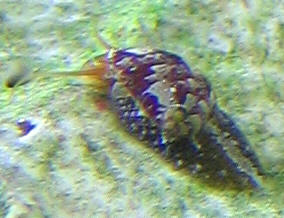
Re: ? Snail ID ayer 1/9/08
Bob - <Joel... Oh there you are!> My apologies. I don't
know what happened to the content and subject line. I would not
be so rude as to intentionally do such a thing. I wrote an email
describing my tank setup and how much you and your crew have
helped me get 6 months into the hobby with nary a problem that
wasn't foreseen. Thanks for the response to what my question
was - "any idea what these might be, perhaps some sort of
Nudibranch?" I will read up on Stomatella now. Thank you
again. Regards, Joel Pippin <Looked like S. varia to me.
Cheers, BobF>
|
Snail ID/James' Input 1/6/08 Hi Bob/crew,
<Hi Sara> One of my friends is asking me about this snail he
found in his tank. It definitely looks like a whelk or murex of
some sort, but I wish I could narrow it down more than that for
him. The body coloration is not like that of any other snail
I've seen in an aquarium before (not that that means much).
<Sara, this looks more like a Tulip Snail to me, no expert
though. If so, they are predatory, will feed on Astrea, Turbo, and
other snails.> Thanks,
<You're welcome. Sara-- |
|
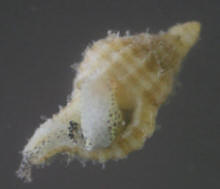
Snail ID/Lynn's Input -
1/6/08 Hi Bob/crew, <Hi Sara> One of my friends is
asking me about this snail he found in his tank. It
definitely looks like a whelk or murex of some sort, but I
wish I could narrow it down more than that for him.
<I'm in agreement with you and James. It does look
like something in the Buccinoidea (Whelks, Tulip Snails,
etc), or Muricoidea (Murex) superfamilies. I haven't
found an exact match, but I do have some candidates that are
similar. Unfortunately, that's about as close as I can
get without a super clear photo of the shell front and back,
or knowing where this little guy is from. Here you go:
http://www.conchology.be/en/availableshells/shellsforsaledetails.php?uniquenumber=164124#f
http://www.conchology.be/en/availableshells/shellsforsaledetails.php?uniquenumber=201755#f
http://www.gastropods.com/5/Shell_7095.html
http://www.conchology.be/en/availableshells/shellsforsaledetails.php?uniquenumber=370154#f
.> The body coloration is not like that of any other snail
I've seen in an aquarium before (not that that means
much). <I have some photos of a Whelk hitchhiker from my
tank (Cantharus tinctus) with similar tissue
coloration/markings (may provide a clue):
http://wetwebfotos.com/usermedia/high/0/2470_50.jpg The focus
could be a lot better on the tissue here, but you get the
idea: http://wetwebfotos.com/usermedia/high/0/2470_51.jpg
.> Sara
<You're very welcome! -Lynn> |
|

|
|
Need an ID on a snail: Collonista sp. -
1/5/08 WWM crew, <Hi Nick.> Good evening. <And the
same to you!> I am trying to I.D. this snail. I cannot find
anything that looks like it any help would be appreciated. It is
about the size of a pea and is spherical. I only see them at night.
There are about 3 that I can tell. <Looks like you've got a
pretty little Collonista sp. snail there. They're terrific
little grazers - mostly nocturnal, and top out size-wise at about
1/4" (around 3mm or so is the norm). They vary in color
(brown/tan/white/even pink), and pattern, but all have a
distinctive pit in the center of the operculum. These snails do
reproduce in tanks, but rarely do the numbers get out of hand. One
thing I will mention is that there have been occasional reports of
them getting stuck/causing problems with equipment (intakes and
such). However, that same potential exists for just about any other
snail as well. I've never had a problem with these guys, but I
have with others. All in all, these are terrific little snails and
a great addition to a tank. Please see this link for more
information re:
http://www.reefkeeping.com/issues/2004-05/rs/index.php .> Thanks
in advance, Nick
<You're very welcome! Take care --Lynn> |
|
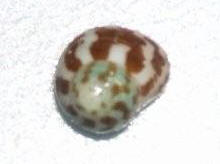
|
|
That's no Nassarius! That's a predatory
Olive snail! -- 12/24/07 Hey WWM crew. <Hi there.> I
have been reading lots about identification of snails, and have
identified the snails that have been trolling my tank as cap
snails. <Neat. Stomatellids are terrific little grazers that
make a nice addition to a tank.> Also have been reading on
some other snails people have encountered and found this one
interesting. Attached below. I also bought 4 of these snails at
one time (sold as Nas) <Ugh -- don't even get me
started!> and watched them eat one of my Astrea snails.
<Yep, what a shame. These Olive snails are beautiful, but are
predators/scavengers, and look nothing remotely like a Nassarius.
How they can be sold as such is beyond me.> After hours of
searching I found out what it was. I got rid of them right away.
<Understandable -- hopefully you educated the seller!> Just
saw a few people had questions and that you guys were unsure of
the identification. Lettered Olive Snail Oliva sayana <Much
appreciated! Here's another photo of one, as well: Take care
-Lynn>
|
|
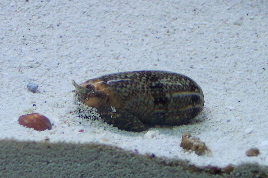
|
|
Snail ID and Mystery "Things" in Tank
- 12/16/07 <Hi there. I sincerely apologize for the delay
in answering!> First, I have a massive population explosion of
limpets and snails. I have attached a picture of the snail.
Hopefully you can help me ID this sucker. <Sure can! The
little snails you're seeing are Collonistas. They're
harmless/beneficial grazers, vary in color (tan/brown and white,
white, even some pink and white), reproduce readily in our tanks,
and are mostly nocturnal. They also stay small, around 3-4mm.
Please see this link for more info/photos:
http://www.reefkeeping.com/issues/2004-05/rs/index.php> The
second is more complicated. <Heee, I'll second that!>
About a 5-7 days ago I noticed a white web or cocoon type
structure in my life rock. The white material has since gone away
and left behind are these reddish pink multi-lobed balls with a
bit of white "fuzz". Could these be some kind of egg or
something? I have attached a pic? <They don't look like
eggs. However, I need a bit more information in order to narrow
things down. Are these things hard, leathery, or soft? Has there
been any change in appearance since you first wrote in? By the
way, I couldn't help but notice several fine examples of
'tree-like' white Foraminiferans in your photo. Very
pretty!> Thanks <You're very welcome, and again, my
apologies for the delay! -Lynn>
Re: Snail ID and Mystery "Things" in
Tank - 12/17/07 <Hello again!> Thank you for the
response. <You're very welcome.> I have taken a close
look, and although they have been moved around by the current,
they seem to have attached themselves where they lie. Not much
has changed in their appearance with the exception of a tiny bit
more white fuzz on them. <Would love to see a close-up of
this!> Could this have been a way that the pinkish-red
structure on the live rock, that they are sitting on in the pic,
replicates itself? <Wondered the same thing myself. Is that
pinkish-red structure hard, or soft (need to know same regarding
the little nodules)? The larger structure, at first glance, looks
very much like a Foraminiferan (Homotrema rubrum). Problem is,
after taking a close look at it, I don't see the typical
white, hair-like, feeding structures. Another possibility is that
it's a Rhodophyta (red algae) of some variety. That's why
I need to know if it's soft/flexible, or hard/stony
feeling.> Size wise they are about the size of a pin head.
<Thanks. That's a little smaller than I thought.> I
also have another potential issue. I have a Scopus Tang that
seems to be exhibiting some dark wear marks on its dorsal fin and
tiny "light colored" marks along either side near the
upper part of it's body. - seems to be acting fine but I am a
little concerned. I have tried to get a good pics but have been
unsuccessful. I will keep trying. Any thoughts?
<Unfortunately, this is out of my area of expertise. Please do
try to obtain a good photo and submit your query with as much
information as possible regarding tank size/parameters, whether
fish is still acting/feeding normally, what you feed it, how long
you've had it, other tankmates, etc. Take care -Lynn>
|
|
 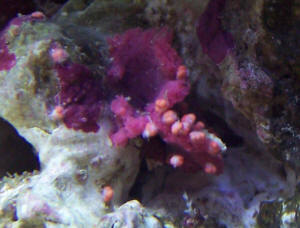
|
Mr. limpet and the Pyramids -12/15/2007 Hello
crew, I try to avoid asking questions and believe I have only asked 2
so far. Usually I can find all my answers with research on your site
and or others. This one seems to allude me though. I have been running
a 55g reef for 2 years now. The last year has been really great. Anyway
this question doesn't really pertain to lighting or water
parameters so I will skip that this time. I was doing some research on
clams because some day I would like to own one. I then stumbled across
something called Pyramidellid snails. To my amazement I have recently
noticed these little guys before. They were on my turbo snails!! After
I found out what they were I promptly brushed them off of my snails and
waited for dark. ("the freaks come out at night") Here they
were by the hundreds! Now at this point according to my calculations
manual removal of such little creatures would take somewhere between
100 to 1,000,000 years. I also have hundreds of limpets that don't
seem to bother anything in my tank including the Montipora. Now here it
is, will the Pyramidellids feed off of the limpets? Therefore removing
the snails for a long period off time to remove the Pyramidellids food
source thus starving them to death would not work, correct? I also
cannot use a six line wrasse or other type to help control nor do I
think a wrasse would work effectively anyway. Any Ideas? <Well,
first things first... please make sure you have the "bad
guys" before you start to worry (or start killing them en mass).
There are several harmless/beneficial snails which look very similar.
Please see here:
http://www.reefland.com/rho/2006/05/identify_rissoid_pyramidellid_snails.php>
I apologize for the incomplete e-mail. <no worries> Any help on
this subject would be greatly appreciated. Thanks,
Nick
<De Sara M.>
|
|

